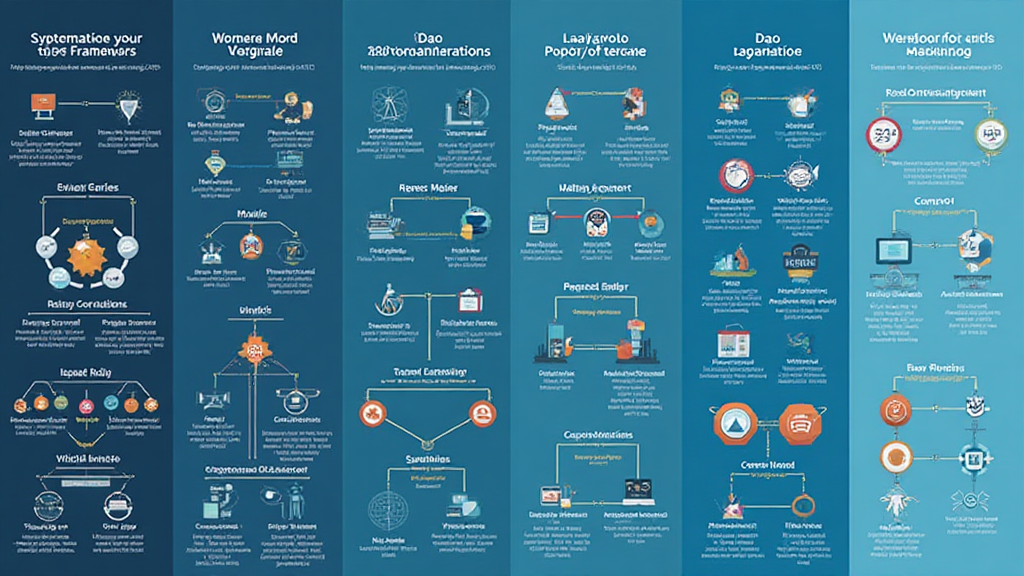Exploring Cryptocurrency DAO Frameworks: Future of Decentralized Governance
In the rapidly evolving landscape of digital assets, the concept of Decentralized Autonomous Organizations (DAOs) has emerged as a groundbreaking development in the cryptocurrency universe. According to recent studies, DAOs have seen a significant uptick, with over 4,000 DAOs in existence by 2025, reflecting a growing interest in decentralized governance structures.
But what exactly are DAOs? At their core, these organizations utilize blockchain technology to automate governance processes through smart contracts, allowing decision-making to be community-driven rather than reliant on a centralized authority.
Understanding Cryptocurrency DAO Frameworks
At the heart of DAO functionality are various frameworks that dictate how they operate. These frameworks vary in their organizational structure, governance mechanisms, and use cases. Here’s a brief overview of the most popular ones:

- Ethereum-based DAOs: Utilize the Ethereum blockchain to execute smart contracts, enabling transparency and trust among participants.
- Aragon: A tool that allows anyone to create and manage a DAO, democratizing governance.
- Moloch DAO: A minimalist framework which emphasizes simplicity and security, focusing on funding Ethereum development.
These frameworks are not just technical constructs but are also critical to the operational dynamics of cryptocurrency projects, influencing everything from community engagement to funding allocation.
The Role of Governance in DAOs
A pivotal feature of any DAO is its governance. Unlike traditional organizations where decision-making is often top-down, DAOs employ methods like token-based voting, where power and responsibility are distributed among token holders.
For instance, in a DAO, each token might grant a vote for community proposals, ranging from funding allocations to strategic developments. This not only fosters greater involvement from the community but also helps align the interests of the organization and its members.
Tokenomics: The Power Behind DAOs
Tokenomics is crucial for incentivizing participation in a DAO. By carefully designing token supply and distribution, organizations can create economic models that reward active participation while ensuring sustainability. For example:
- Governance Tokens: Allow holders to vote on key issues, effectively shaping the direction of the project.
- Utility Tokens: Can be used for accessing specific services within the DAO, promoting active engagement.
Effective tokenomics is paramount in building a robust DAO that can withstand market fluctuations while maintaining user trust and participation.
Challenges Facing Cryptocurrency DAOs
While the potential of DAOs is vast, several challenges loom on the horizon:
- Smart Contract Vulnerabilities: The reliance on smart contracts introduces risks. According to Chainalysis 2025 report, vulnerabilities in smart contracts contributed to a loss of over $1.8 billion in the last year alone.
- Regulatory Uncertainty: The evolving regulatory landscape may lead to compliance challenges that DAOs need to navigate carefully.
- Community Engagement: Ensuring continuous and meaningful participation from members can be difficult.
Addressing these challenges requires collaborative efforts within the community and innovative solutions to bolster security and engagement.
DAO Security: Best Practices
Security is vital for the success of any DAO. Here are some best practices:
- Auditing Smart Contracts: Regular audits can detect vulnerabilities, ensuring robust security measures are in place. For instance, employing platforms like hibt for auditing services can help enhance this aspect.
- Multi-signature Wallets: Using multiple signatures for transactions can significantly reduce hacking risks.
- Transparency in Processes: Maintaining an open ledger of all decisions made within the DAO can build trust and accountability.
Real-World Applications of DAOs
The real-world applications of DAOs are varied, spanning from investment clubs to social causes:
- Investment DAOs: Groups pool resources and collectively decide on investments based on community voting.
- Charitable DAOs: Enable communities to fundraise for social causes while ensuring transparency in the allocation of funds.
- Project Development DAOs: Facilitate collaboration among developers and stakeholders to drive innovations in the blockchain space.
As DAOs continue to mature, their applications will likely expand, offering more innovative solutions to both investors and communities.
The Vietnamese Market and DAO Adoption
The interest in DAOs isn’t limited to Western markets; Vietnam is seeing significant growth in this area. With a reported user growth rate of 300% in crypto-related platforms over the last year, the Vietnamese market presents a ripe opportunity for DAOs to flourish.
As more users enter the space, harnessing the potential of DAOs can provide unique governance solutions tailored to local needs, ultimately benefiting the entire community.
The Future of Cryptocurrency DAO Frameworks
The future of DAOs looks promising. As technology and regulatory frameworks evolve, we can expect increased adoption and sophistication in how these organizations function.
In preparation for a future where DAOs play a central role in governance and investment, developers and investors alike should stay informed about:
- Emerging trends: Keeping an eye on innovations in DAO frameworks to harness new features and capabilities.
- Security practices: Keeping abreast of the latest best practices for auditing and securing smart contracts.
- Community engagement: Finding innovative ways to structure community input and participation.
In summary, the evolution of Cryptocurrency DAO frameworks presents exciting opportunities and challenges. With the proper foresight and planning, DAOs could redefine how we think about governance and cooperation in the digital age.
To conclude, as the landscape surrounding DAOs develops, stakeholders must engage actively with both the advantages and the challenges presented by these frameworks. Whether you’re a developer, investor, or enthusiast, it’s essential to understand the nuances of these systems.
This exploration of Cryptocurrency DAO frameworks provides a glimpse into the future of decentralized governance and its potential impact on the cryptocurrency ecosystem. Stay tuned to cryptocoinnewstoday for more insights and updates!
—
Author: Dr. An Nguyen, Blockchain Expert, with over 20 published papers in the field of decentralized technologies and a lead auditor on notable blockchain projects.





